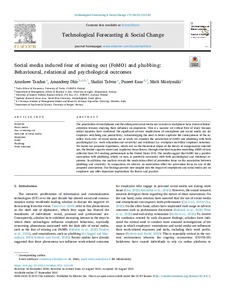Social media induced fear of missing out (FoMO) and phubbing: Behavioural, relational and psychological outcomes
Tandon Anushree; Dhir Amandeep; Talwar Shalini; Kaur Puneet; Mäntymäki Matti
https://urn.fi/URN:NBN:fi-fe2022021619551
Tiivistelmä
The penetration of smartphones and the subsequent social media use in modern workplaces have drawn scholars’ attention towards studying their influence on employees. This is a nascent yet critical field of study because initial inquiries have confirmed the significant adverse implications of smartphone and social media use for employee well-being and productivity. Acknowledging the need to better explicate the consequences of the so-called ‘dark side’ of social media use at work, we examine the association of FoMO and phubbing with both psychological (i.e. work exhaustion and creativity) and relational (i.e. workplace incivility) employee outcomes. We tested our proposed hypotheses, which rest on the theoretical tripod of the theory of compensatory Internet use, the limited capacity model and regulatory focus theory, through structural equation modelling (SEM) of data collected from 243 working professionals in the United States (US). The results suggest that FoMO has a positive association with phubbing, which, in turn, is positively associated with both psychological and relational responses. In addition, our analysis reveals the moderation effect of promotion focus on the association between phubbing and creativity. In comparison, we observe no moderation effect for prevention focus on any of the proposed associations. Our findings provide new insights into the impact of smartphone and social media use on employees and offer important implications for theory and practice.
Kokoelmat
- Rinnakkaistallenteet [29335]
